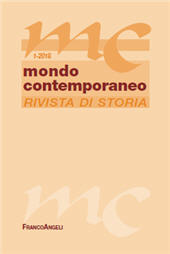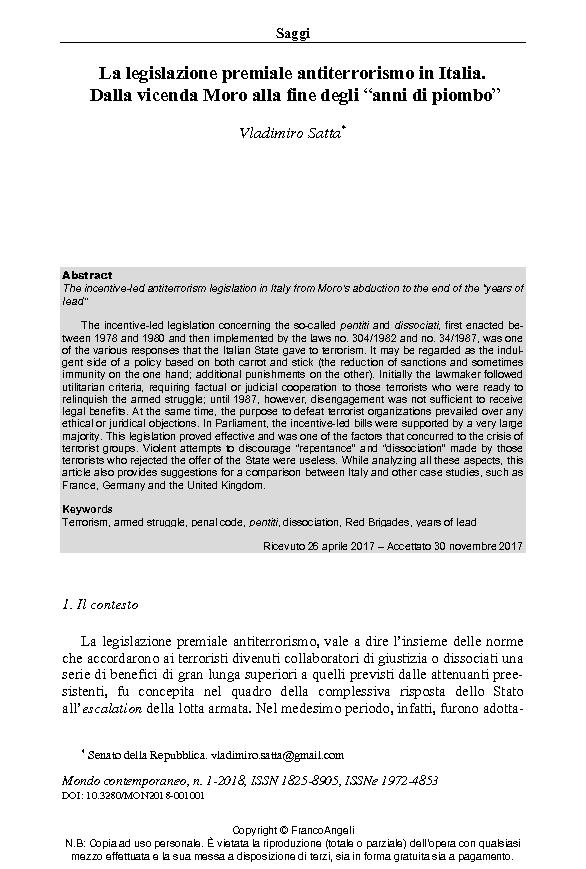La legislazione premiale antiterrorismo in Italia : dalla vicenda Moro alla fine degli anni di piombo
5-34 p.
La legislazione premiale antiterrorismo, avviata tra il 1978 e il 1980 e culminata nelle leggi 304/1982 sui "pentiti" e 34/1987 sui "dissociati", fu concepita nel quadro della risposta dello Stato all'escalation della lotta armata e può essere considerata il lato benevolo di una politica che alternava il bastone (aggravanti per reati con finalità terroristiche) e la carota (riduzione delle sanzioni e talora immunità per chi aiutava la giustizia o deponeva le armi). Inizialmente il legislatore seguì una logica utilitaristica, richiedendo collaborazione sostanziale o probatoria a chi intendeva abbandonare la lotta armata, mentre fino al 1987 la mera dissociazione non fu ancora sufficiente per avere sconti di pena. Il fine primario, debellare i gruppi armati, prevalse su ogni obiezione etica e giuridica. La legislazione premiale, approvata da maggioranze parlamentari molto ampie, fu efficace, anche grazie alla concomitanza di altri fattori che misero in crisi i gruppi armati.
I violenti tentativi di scoraggiare pentitismo e dissociazione fatti dai terroristi che rifiutavano la via di uscita offerta dal legislatore risultarono vani. Il saggio fornisce anche elementi di comparazione tra il caso italiano ed esperienze simili in Francia, Germania e Regno Unito. [Testo dell'editore].
The incentive-led legislation concerning the so-called pentiti and dissociati, first enacted between 1978 and 1980 and then implemented by the laws no. 304/1982 and no. 34/1987, was one of the various responses that the Italian State gave to terrorism. It may be regarded as the indulgent side of a policy based on both carrot and stick (the reduction of sanctions and sometimes immunity on the one hand; additional punishments on the other). Initially the lawmaker followed utilitarian criteria, requiring factual or judicial cooperation to those terrorists who were ready to relinquish the armed struggle; until 1987, however, disengagement was not sufficient to receive legal benefits. At the same time, the purpose to defeat terrorist organizations prevailed over any ethical or juridical objections. In Parliament, the incentive-led bills were supported by a very large majority. This legislation proved effective and was one of the factors that concurred to the crisis of terrorist groups.
Violent attempts to discourage "repentance" and "dissociation"!made by those terrorists who rejected the offer of the State were useless. While analyzing all these aspects, this article also provides suggestions for a comparison between Italy and other case studies, such as France, Germany and the United Kingdom. [Publishers' text].
-
Articles from the same issue (available individually)
-
-
Information
ISSN: 1972-4853
DISCIPLINES
KEYWORDS
- Terrorismo, lotta armata, codice penale, pentiti, dissociati, Brigate Rosse
- Terrorism, armed struggle, penal code, pentiti, dissociation, Red Brigades, years of lead



